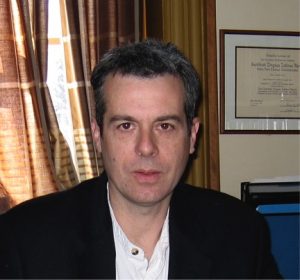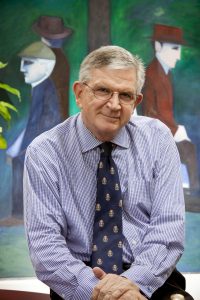 James Wetzel is Professor of Philosophy and holds the Augustinian Endowed Chair at Villanova University. We invited him to answer the question “What does philosophy of religion offer to the modern university?” as part of our “Philosophers of Religion on Philosophy of Religion” series.
James Wetzel is Professor of Philosophy and holds the Augustinian Endowed Chair at Villanova University. We invited him to answer the question “What does philosophy of religion offer to the modern university?” as part of our “Philosophers of Religion on Philosophy of Religion” series.
There are many different constituencies, often rival, that get housed in the modern university. Difference, these days, is widely thought of as a desirable and necessary thing; if fostered in the right way, difference conveys openness of spirit and so liberation from the silos of estranged subjectivities. We become, for one another, exit doors from fear and ignorance—and exits into the wonder. Sounds lovely. But there is of course the other part. The cultivation, protection, and even enforcement of difference—different disciplines, different histories, different sensibilities, different looks, different loves—can become estrangement by other means; we burrow into constituencies that are anxiously intent, like tribes post Babel, on policing their borders. The university has traditionally aspired to unity of some kind, a unity that gets draped in the language of higher values, where words like truth, love, light, God, and justice have pride of place. The university, in its modern history, has had to weather considerable skepticism about grandiose calls to higher unity (whose?), and yet it still wishes for a diversity that comes to more than a cacophony of separately funded interests.
Can philosophy of religion be of help here? It is a strange and forlorn question if we have already boxed up philosophy of religion as a sub-discipline within a discipline that prides itself on the mastery of reason. Rigorous arguments for or against the coherence of theism and the likelihood of God’s existence are not likely to advance the modern university’s educational interests in diversity, and not simply because the God of all the omni proprieties—omnipotence, omniscience, omnipresence—turns out to be as much of a cultural artifact as any other human conception of divinity. Add other conceptions to your heart’s content; venture into different cultures and histories; embrace religious pluralism; respect secularism. If your conception of reasoning is still so formal that you can imagine mastering it apart from the untidy business of sharing your life with others, then your higher values will remain unpopulated.
I make no criticism here that I do not make of myself. I have been fiddling with the packaging of philosophy of religion for decades, and still I barely have a grip on the difference that, for me, lies at the beating heart of the philosophy of religion: knowledge in contrast to wisdom. (Perhaps part of my problem here is that I am too fixated on the metaphor of grasping.) Rather than define the difference between knowledge and wisdom for you (more grasping), I offer a scene from Plato’s Phaedo, the dialogue that details the death of the philosopher, and a few words of interpretation.
In the scene I have in mind, the great teacher, Socrates, has been helping his students think toward the life that has been freed from the specter of fear of death. His students wish from him, especially the foreign ones, Simmias and Cebes, a rigorous proof of the soul’s immortality; they want a guarantee, in other words, that they go on, even when their bodies do not. The issue is very topical for Socrates, who faces having to drink hemlock at sunset and die for the suspect religion he calls philosophy. The arguments for the soul’s immortality go well at first, until, all of a sudden, they do not. (It proves difficult, if not impossible, to think of soul other than in bodily terms, and bodies disintegrate.) Socrates cautions his students not to become “misologists”—a Platonic coinage that means “haters of logos.” The sense of logos here is usually taken to be “argument” or “reason.” Most people, Socrates says reassuringly, are still reasoners in training; they should not be dismayed when their best arguments are later revealed to be deficient. He advises both Simmias and Cebes, who have put the most stake in the revelatory power of a good argument, to value the truth more than they do Socrates and continue the hunt for a better logos.
I see two quite different ways to read this scene. In one, Socrates is advising his students to perfect their reasoning beyond all possibility of further revision. That may take lifetimes, if indeed there are lifetimes to be had, and along the way they will continue to fear what has yet to be wholly rationalized. No matter; they are to value truth over anyone, even Socrates, their beloved teacher. (They did at first want to to console him with consoling arguments.) In the other reading of this scene, the one I favor, Socrates unburdens his students of the need to reassure him: yes, care more for truth than for the man you presume to pity. The integrity of a Socrates in the face of death is in no way dependent on a form of argumentation that circumvents the need of one human being to keep company, in the midst of ineliminable uncertainties, with another. Here there is no ambition to perfect reason (a Cartesian and broadly modern fantasy); there is only the question of whether we will use words to commend one another to the imminent good of a shared life or whether we will use them to dress up ignorance and fear as some kind of mental toughness.
I would like to think that philosophers of religion—or those of us who have yet to exile love from the citadel of reason—offer the modern university a measure of respite from the obsessiveness of knowing. The uncertainty that is home to wisdom is to be inhabited, not resolved. It is space for the goodness that no one possesses or consumes.



